The Best Fluffy Pancakes recipe you will fall in love with. Full of tips and tricks to help you make the best pancakes.
Signature Ramadan Meals of Tunisia
Ramadan in Tunisia is a time of deep spiritual devotion, family gatherings, and rich culinary traditions. As families break their fast at iftar, they enjoy some of Tunisia’s iconic dishes, from flavorful soups to crispy Brik and sweet Makroud. In this guide, we explore the signature Ramadan meals of Tunisia, highlighting the must-try dishes and their significance during the holy month.
How Is Ramadan Observed in Tunisia?
Ramadan is a significant and cherished time in Tunisia, marked by unique traditions and deep spirituality. During this holy month, Tunisians fast from dawn to sunset, abstaining from food, drink, and other physical needs to reflect on faith and self-discipline. Families gather for the “Iftar” meal at sunset, breaking their fast with dates and water, followed by traditional dishes like brick, harira soup, and sweets such as makruh. Mosques have become central to Ramadan, with many attending nightly prayers called Tarawih. Streets and homes are beautifully decorated, and social gatherings blossom as people celebrate. The last ten days of Ramadan hold special significance, with increased prayers and acts of charity. Ramadan in Tunisia is a time of togetherness, devotion, and cultural pride, making it a distinctive experience.
Traditional Ramadan Customs in Tunisia?
Tunisia’s Ramadan customs blend religious devotion with rich cultural heritage. One notable tradition is the communal preparation of meals, where neighbors and extended families share in cooking Ramadan specialties. Sweets like zalabia and bambalouni are particularly popular during this time, often enjoyed late into the night after prayer gatherings. Local markets, or souks, come alive with the vibrant hustle and bustle of people buying fresh ingredients and festive decorations. Another cherished custom is beating the “Nafar” drum, which historically served to wake people for Suhoor, the pre-dawn meal. Additionally, it is common for Tunisians to host orphans and those in need of Iftar, embodying the spirit of charity and generosity. These customs make Ramadan in Tunisia a time of piety and a celebration of community and tradition.
What Are the Best Foods to Try During Ramadan in Tunisia?
After a long day of fasting, Tunisian iftar tables are filled with various traditional dishes that are both flavorful and nourishing. Tunisian cuisine offers a unique Ramadan experience, from hearty soups like Shorba Frik to sweet pastries like zalabia. In this article, we’ll show you 8 of the best Tunisian dishes you must try during Ramadan.
Tajine Jben
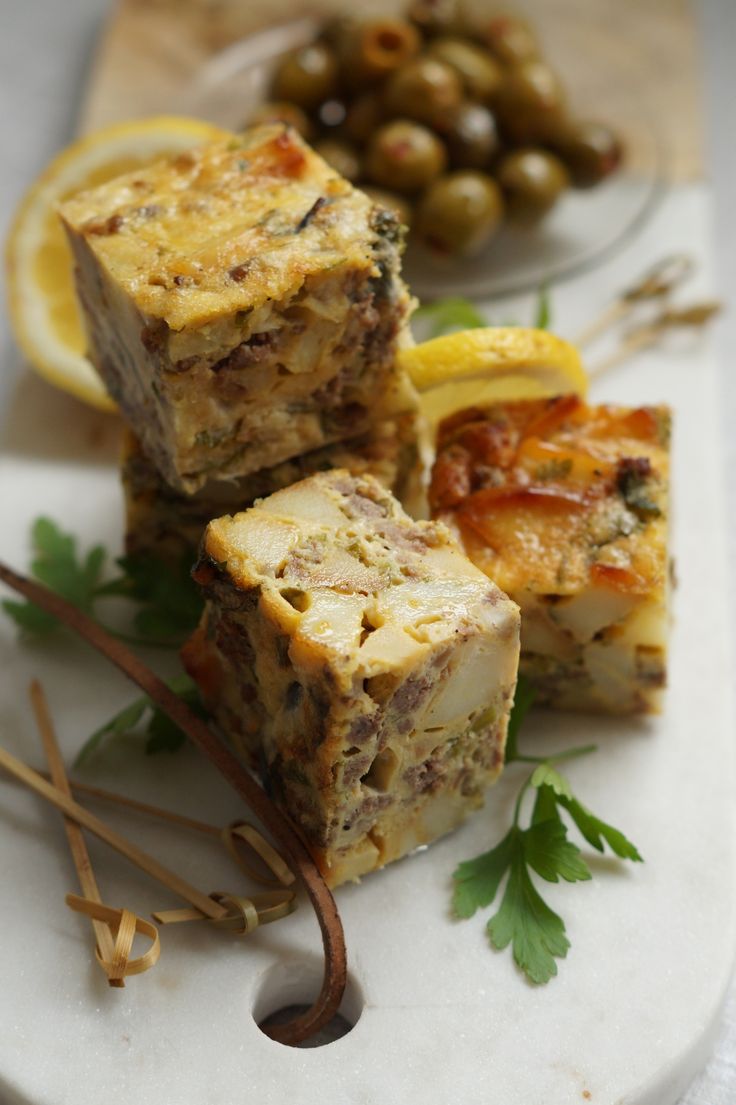
Tajin Jben is a beloved Tunisian dish that perfectly blends tradition and flavor, making it a staple on Ramadan iftar tables. Often compared to a quiche, Tajin Jben is crafted from eggs, cheese, minced meat or chicken, and various spices. The dish is baked perfectly, achieving a golden crust with a soft and savory interior. One of its distinguishing features is the addition of cheese, which enhances its rich and satisfying taste. It’s a crowd-pleaser and highly versatile, as families often customize the ingredients to reflect regional and personal preferences. Served warmly, Tajin Jben is a comforting and delicious choice to break the day’s fast.
Lablabi
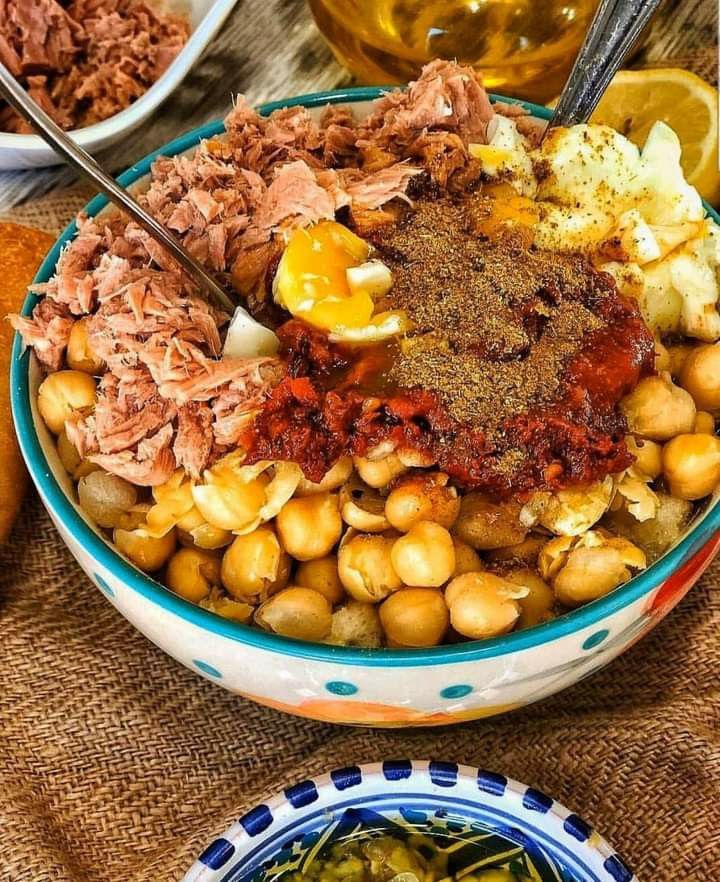
Lablabi is a traditional Tunisian dish that’s simple yet immensely flavorful, making it a favorite during Ramadan. This hearty chickpea soup is known for its warming qualities and is often enjoyed as a comforting iftar meal. The dish begins with a base of boiled chickpeas, which are then flavored with garlic, cumin, and various spices to create a robust and aromatic broth. It’s typically served over torn pieces of stale bread, which soak up the broth and add a delightful texture. Many people top Lablabi with a drizzle of olive oil, a poached egg, or harissa for an added kick of flavor. Customization is key, as diners often garnish the dish with olives, capers, or even tuna, making each serving unique. Lablabi is delicious and incredibly nourishing, providing the perfect energy boost after a day of fasting.
Brik
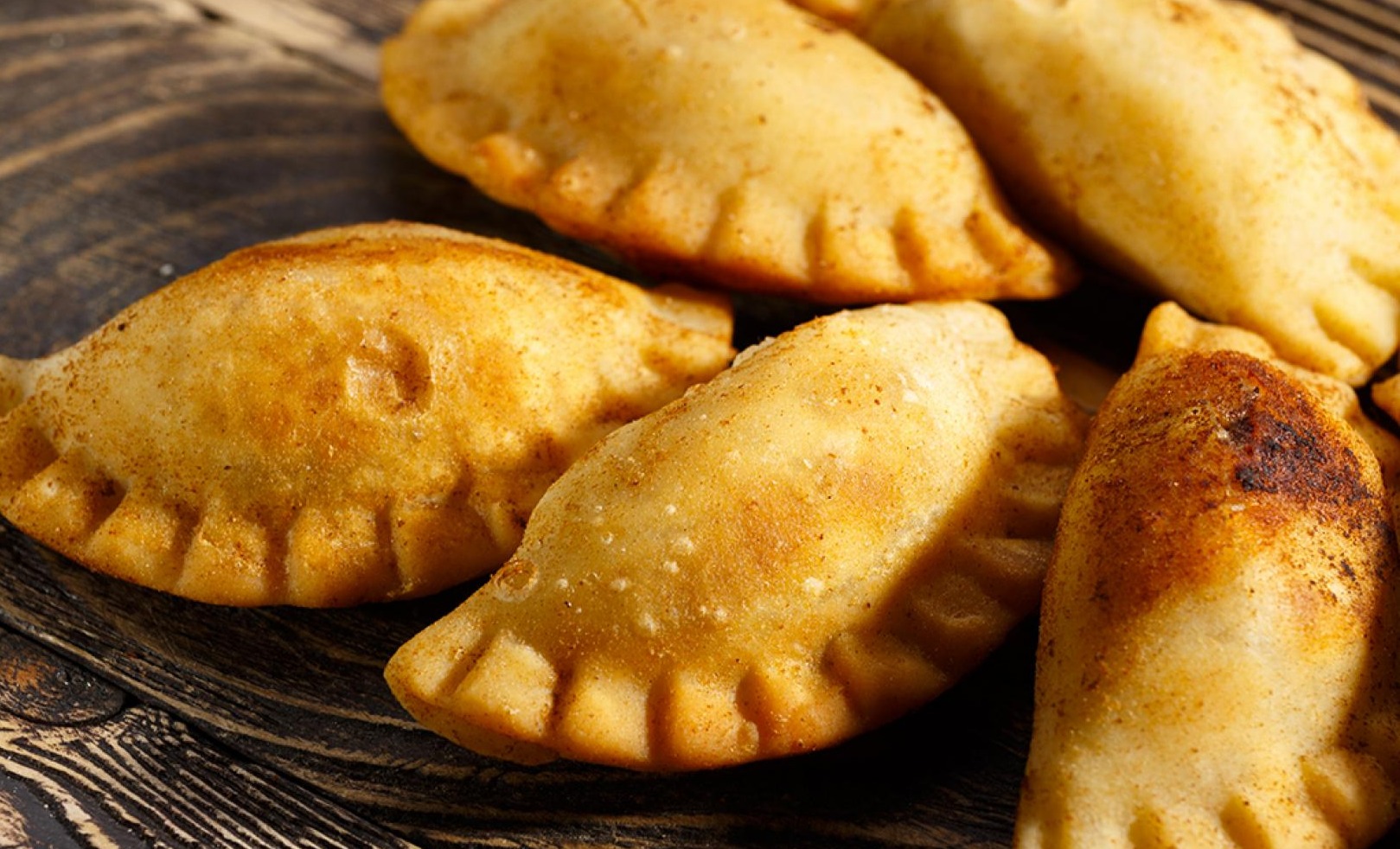
Brik is a beloved Tunisian delicacy, often enjoyed during Ramadan for iftar. This crispy, savory pastry is made by wrapping a thin sheet of dough, known as Matsuoka, around a filling and frying it to golden perfection. The most traditional version features a filling of egg, tuna, parsley, and onion, but variations can include ground meat, cheese, or even mashed potatoes. The key to a perfect Brik is the runny egg yolk inside, which creates a luscious texture when paired with the crispy outer shell. Brik is typically served hot and may be accompanied by lemon wedges for a bright, tangy contrast. Its combination of textures and flavors makes it a satisfying and comforting treat after a day of fasting.
Salata Mechouia
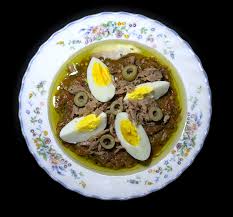
Salata Mechouia, or grilled salad, is a staple of Tunisian cuisine and a favorite dish for everyday meals and special occasions. Made by grilling green peppers, tomatoes, onions, and garlic until charred, the vegetables are finely chopped or blended to create a smoky and flavorful base. The salad is seasoned with olive oil, salt, cumin, and sometimes a touch of harissa for added spice. Often served cold, Slata Mechouia is typically garnished with hard-boiled eggs, olives, or tuna, adding to the richness and visual appeal of the dish. Its balanced flavors and versatility make it a refreshing and delicious addition to any Tunisian table.
Chorba Frik
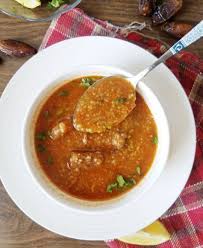
Chorba Frik is a hearty and aromatic soup cherished in Tunisian cuisine, particularly during the holy month of Ramadan. The dish is made with tender cuts of lamb or chicken, frik (cracked green wheat), and a medley of vegetables such as tomatoes, carrots, and celery. Cinnamon, caraway, and turmeric create a rich and complex flavor profile, while fresh herbs like parsley and cilantro provide brightness. Slow-cooked to perfection, Chorba Frik develops a deep, comforting, and satisfying flavor. Often enjoyed as a starter, it pairs beautifully with fresh bread, making it a nourishing and warming addition to any meal.
Makroud
Makroud is a traditional Tunisian pastry that combines rich flavors and textures, making it a favorite treat nationwide. This sweet delicacy is made from semolina dough, which is filled with a luscious date paste and shaped into small diamonds. The pieces are then lightly fried until golden and soaked in a fragrant honey syrup infused with orange blossom water, adding a delightful floral note. Makroud is often enjoyed with tea or coffee, especially during celebrations and festive occasions. Its perfect balance of sweetness and nuttiness ensures that each bite is as indulgent as it is satisfying.
Samsa
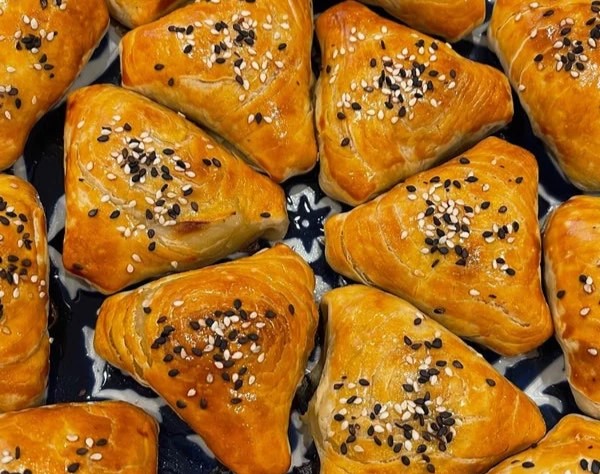
Samsa is a delectable Tunisian pastry cherished for its flaky texture and sweet, nutty filling. This triangular treat is traditionally made by filling thin sheets of dough with a mixture of finely ground almonds, sugar, and aromatic spices such as cinnamon. Once filled and neatly folded into its signature shape, Samsa is fried until golden and crispy. To enhance its sweetness, the pastries are often dipped in honey syrup, which adds a shiny glaze and a rich flavor. Perfectly paired with mint tea, Samsa is a popular choice during special occasions and celebrations, offering a delightful combination of crunch and sweetness in every bite.
Bambalouni

Bambalouni is a beloved Tunisian dessert, often considered the country’s take on a traditional doughnut. Made from a simple dough of flour, yeast, sugar, and water, Bambalouni is skillfully shaped by hand into a round disc or ring before being fried to golden perfection. Once crispy on the outside and light and fluffy on the inside, these delightful treats are generously dusted with powdered sugar. Bambalouni is a popular snack among locals and visitors alike, frequently enjoyed fresh and warm from street vendors. Its sweet, airy texture makes it a delightful indulgence, often paired with coffee or tea for an afternoon treat or dessert.
conclusion
Ramadan in Tunisia is a time of spiritual reflection, culinary tradition, and community bonding. From the nourishing Lablabi to the sweet indulgence of Makroud, the country’s Ramadan meals reflect history and hospitality. Whether observing Ramadan or simply exploring Tunisian cuisine, these dishes capture the essence of the holy month.
Explore More Delicious Ramadan Dishes:
Must-Try Ramadan Dishes in Algeria
Historical Ramadan Dishes of Egypt
Must-Try Ramadan Dishes in Qatar | Traditional Qatari Iftar Foods
Ramadan Delicacies from Jordan You Need to Taste
Ramadan Foods Rich in Tradition from Sudan: Must-Try Dishes
Iconic Ramadan Dishes You Can’t Miss in Oman


[…] Signature Ramadan Meals of Tunisia […]
[…] Signature Ramadan Meals of Tunisia […]
[…] Signature Ramadan Meals of Tunisia […]
[…] Signature Ramadan Meals of Tunisia […]
[…] Signature Ramadan Meals of Tunisia […]
[…] Signature Ramadan Meals of Tunisia […]